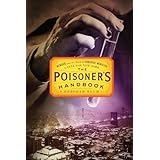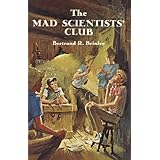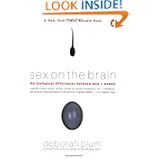 |
| Thallium courtesy of Chemical Elements.com |
Great dartboard? Nope, it’s a molecular depiction of Thallium. Incredibly toxic and almost tasteless, it was the poison of choice for murder not all that long ago. My guest today holds a fascination for all things that can make you keel over with a sip. Her bestselling book, “The Poisoner’s Handbook: Murder and the Birth of Forensic Medicine in Jazz Age New York”, is beyond interesting and makes me want to hire a food tester.
Deborah Blum is a Pulitzer Prize winning reporter and a bestselling author. While she writes to entertain, she informs as few authors can. Deborah also takes us through the evolution of forensic science that led to being able to catch a killer that would have gone unnoticed. “The Poisoner’s Handbook” is one very cool read.
Here is a bit about my guest:
 “Deborah Blum (born October 19, 1954) is a Pulitzer Prize-winning journalist and the author of The Poisoner's Handbook: Murder and the Birth of Forensic Medicine in Jazz Age New York.”
“Deborah Blum (born October 19, 1954) is a Pulitzer Prize-winning journalist and the author of The Poisoner's Handbook: Murder and the Birth of Forensic Medicine in Jazz Age New York.” I’m pleased to welcome bestselling author Deborah Blum to The Novel Road…
 |
| Deborah Blum |
Me: The Poisoner’s Handbook fascinated me. A bestseller and Top 100 book choice for 2010, I’m obviously not alone in my curiosity about poisons and the history of forensic science. From Socrates last words: “I ordered Glenloch, not Hem…” to Cary Grant in “Arsenic and Old Lace”, and digging up past Presidents, poisons have a disturbing place in world history. How did you decide on poisons as a subject for your book?
Deborah: I grew up reading my mother's collection of early 20th century mysteries - Agatha Christie, Dorothy Sayers, Georgette Heyes, Leslie Ford, Ellery Queen, Rex Stout - and those writers were masters at spinning elegant, slippery tales of poison murders. So I was long-fascinated by the deviousness of a poison killer. Later when I became a science writer, I started thinking about writing a book that might be an old-fashioned murder mystery but also a primer on the really fascinating chemistry of lethal substances. And that idea eventually became The Poisoner's Handbook.
 Me: I often wonder about the chemicals introduced into society over the last 100+ years and diseases that appear to be more prevalent than earlier centuries. Is it possible that the increasing prevalence of diseases like Alzheimer’s, Parkinson’s, systemic autoimmune diseases (i.e. Lupis) and many cancers have ties to toxic exposure of past generations?
Me: I often wonder about the chemicals introduced into society over the last 100+ years and diseases that appear to be more prevalent than earlier centuries. Is it possible that the increasing prevalence of diseases like Alzheimer’s, Parkinson’s, systemic autoimmune diseases (i.e. Lupis) and many cancers have ties to toxic exposure of past generations?Deborah: Don't you wish there were some good studies into that question? Yes, I've no doubt we're haunted in many ways by our chemical past. Think of the common use of poisons like arsenic as insecticides, lead in pain and gasoline, mercury in medications - all heavy metals that bioaccumulate. At least we're getting smarter about those elements. Although, of course, we go on to replace them with others.
 Me: When you were young, did you happen to read any Bertrand R. Brinley? His “Mad Scientist Club” books still hold fond memories for me.
Me: When you were young, did you happen to read any Bertrand R. Brinley? His “Mad Scientist Club” books still hold fond memories for me.Deborah: No, but now you've got me very interested!
Me: Looking at your bio and curriculum vitae as a journalist and author, you have a broad and curious nature. Though a definite lean toward science, you find ways to bring your acumen to thoroughly interesting topics and make them accessible to everyone. Talk about your decision making paradigm and how you are able to teach as well as entertain.
Deborah: I think of myself as kind of subversive. If you look at Poisoner's Handbook, it's foremost a story about a couple of heroic forensic scientists trying to decipher poisons, catch killers, prevent public health disasters. But behind that is my own fascination with chemistry as a beautiful, fundamental and sinister science. So I try to find ways to weave the chemistry and use real life to illustrate my points. I do the same thing in my blog, Speakeasy Science (blogs.plos.org/speakeasyscience). Recently I wrote a post called "The Chemist As Murderer" which is about a rather creepy recent murder case in New Jersey, but also about the toxic element thallium, and its history.
Deborah: Oh, the more you experience, the better a writer you become. That's partly because although we can be intuitive about life, we understand it best when we live it - or in some cases live through it. Also, experience just illuminates the way we write. I once wrote a piece for a Rolling Stone book which included a story about my grandfather's stroke and the way he looked afterwards, the way his eyes turned "the frozen blue of a winter sky." I was in the middle of a Wisconsin winter when I wrote that and all the pieces - the sadness and the loss - just came together in my head.
 |
| Willaim James |
Me: Lunch with you and any author or scientist you choose, from throughout history or today, and why.
Deborah: The 19th century psychologist-philosopher William James, who is actually one of the stars of my book, Ghost Hunters. I've read so many of his letters and he has the most amazingly flexible and fearless mind - at least on paper. I'd love to talk with him in person and find out if he lives up to my image of him.
 Me: “Sex on the Brain”, “Love at Goon Park”, “Ghost Hunters” and “The Poisoner’s Handbook”, even your Pulitzer Prize winning article turned book “The Monkey Wars” all seem to be a Doctoral course for writing a…NOVEL! Give me a Deborah Blum title and storyline for a Paranormal Romance Murder Mystery Thriller.
Me: “Sex on the Brain”, “Love at Goon Park”, “Ghost Hunters” and “The Poisoner’s Handbook”, even your Pulitzer Prize winning article turned book “The Monkey Wars” all seem to be a Doctoral course for writing a…NOVEL! Give me a Deborah Blum title and storyline for a Paranormal Romance Murder Mystery Thriller.Deborah: A Death in the Borderlands (back in the 19th century, Borderlands was a term mediums used to describe limbo land, essentially, the place whether spirits hover between the worlds of the living and the dead). So this would be a story about a medium that has to connect with spirits caught in the borderlands to help solve a murder. As the story deepens, and other murders happen, she gets pulled deeper and deeper into mysteries on both planes. The very pragmatic police detective working with her - aha, romantic interest - has to decide how much of this is real and will need to know that answer in the end to save her life! Just made this up, of course, but it could be a pretty cool book.
Me: Publishing is going through an evolution right now. Talk about how this has or will affect you.
Deborah: We're all trying to figure that out, of course. How much of will be digital publishing, how much traditional print. What are the advantages of both? And then there's all the other possibilities - apps, games, my agent says it's practically changing every day.
Me: Talk about researching “Poisoner’s Handbook”. Has the science of today changed any of the finding of Norris and Gettler?
Deborah: Well, Norris and Gettler worked before the sophisticated machines were invented, the ones that we rely on today. The biggest effect of that is that forensic scientists can get information from incredibly tiny samples - a few cells, a whisper of chemical trace. This hasn't changed their scientific findings - Gettler was such a meticulous chemist that his work with cyanide is still cited today - but it does mean that we understand poisons at a molecular level in ways that earlier researchers cannot. And that we can work with barely there clues in a way that they could not.
Me: When can we expect the next Deborah Blum masterpiece? How about a clue on the topic?
Deborah: I'm just finishing up the new proposal now. It's the story of very secret weapons project. Still working my way through declassified documents, actually. It has more of a sci-fi feel to it than anything else I've written so should be very fun.
*******************************************
I'd like to thank Deborah for doing this interview. If I'm invited over for dinner, I'm cooking!
 |
| Image courtesy of animalcrackers.org |
"The New York Times: “The Poisoner’s Handbook is an inventive history that, like arsenic mixed into blackberry pie, goes down with ease.”
"The Washington Post: Not only is "The Poisoner's Handbook" as thrilling as any "CSI" episode, but it also offers something even better: an education in how forensics really works."
